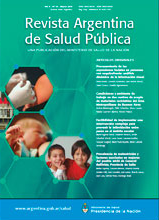Human Milk Bank of Neuquén: health technology assessment, cost and equity impact analysis
Keywords:
Human Milk, Milk Banks, Low Birth Weight Infant, Biomedical Technology Assessment, Health EquityAbstract
INTRODUCTION: Following the creation of the Human Milk Bank (HMB) of Neuquen, which distributes 480 liters per year to public and private health institutions, a health technology assessment was carried out in order to compare pasteurized human milk (PHM) with formula milk in premature and low birth weight children. METHODS: Efficacy, safety, total costs and potential impact on equity were analyzed. A multidisciplinary team conducted a literature search. The cost analysis included equipment with depreciation, maintenance and validation, medical supplies, expenses in serology to donors, general services and human resources, among others. The total annual cost and the cost per milliliter were estimated. Specific points were identified to monitor the impact on equity, mainly related to social determinants of health of donors and beneficiaries. RESULTS: Heterogeneous evidence of moderate to low quality suggests that PHM is a safe and effective intervention. Feeding 33 children with formula milk is expected to cause one extra case of necrotizing enterocolitis (NEC) in this population. DISCUSSION: In addition to reducing the risk of NEC, the PHM strategy could raise awareness about the importance of breastfeeding in the community, giving benefits to the general population that may be difficult to capture in clinical trials and economic evaluations.
Downloads
Downloads
Published
How to Cite
Issue
Section
License
Copyright (c) 2020 Revista Argentina de Salud Pública

This work is licensed under a Creative Commons Attribution-NonCommercial-ShareAlike 4.0 International License.


